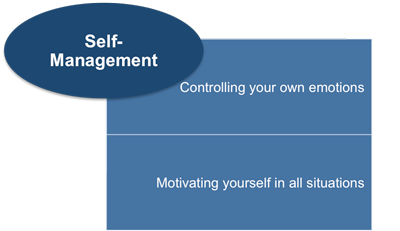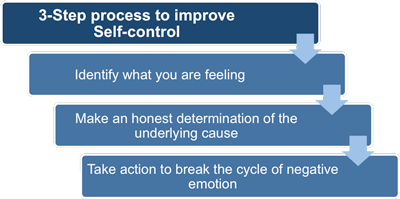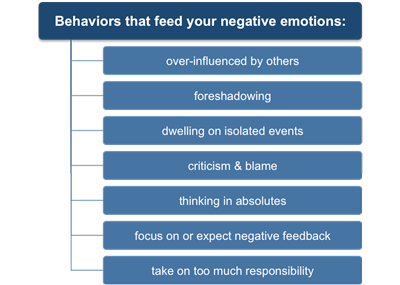Emotional Intelligence and Self-Management
Once you have a clear understanding of your own emotions and how they can impact on situations and others you are ready to progress into the EQ area of self-management. This facet of emotional intelligence builds on the basis of self-awareness and is simply the ability to control your emotions so that they don't control you.
 |
Self-management involves using what you know about your emotions to manage them in such a way as to generate positive interactions with others and motivate yourself in all situations. The very act of acknowledging the fact that you are feeling a negative emotion goes a long way to preventing you from losing control of your own behavior.
EQ self-management is critical for a manager because no one wants to work for someone who is not in control of themselves and whose reactions depend on their prevailing mood. Being able to achieve results by shouting at and bullying team members is a relic of the past. It has no place in modern organizations; people are aware of their rights, and employment tribunals do not support organizations that permit bullying behavior.
Self-management does not mean that you can never become angry. There may be circumstances in which anger is a perfectly reasonable emotional response, but the key is to have control over it so that it can be channeled into resolving the problem at hand. This Assessing Self-Management Checklist provides you with a quick and easy way to assess the self-management aspect of emotional intelligence.
Some people have a strong tendency to overstate in their own minds the negative aspects of a particular situation - for example, fear of a meeting with an important client. If you recognize this trait you should apply the reflective cycle to such situations to ensure that you see them more realistically.
 |
You can also use a simple three-step process to help improve your self-control. This enables you to think logically about scenarios and determine potential ways to deal with them. This goes a long way to diminishing your fear or anger and raises your level of EQ self-management.
Identify what you are feeling - this might simply be a strong feeling over a missed deliverable, unease about a meeting, or longer-term sentiments that there is something wrong with the environment you are working in. Whatever the starting point you will need to exercise self-awareness before you can start to do something about it.
Determine the underlying cause - this is a difficult step because the process requires analysis, reflection, and honesty to identify the cause. Is the sales person who has missed her target angry or resentful towards her boss because he told her she had missed her target, the marketing department because they gave her too few sales leads, or herself for missing opportunities?
Take action - once you've identified the true cause of your emotion you can do something that breaks you out of the cycle of negative emotion. It could simply be to recognize that the emotions that you are feeling are inappropriate or unjustified, or that they are directed at the wrong target.
Only by recognizing the truth behind the causes of your emotions will you be able to control and manage them even when you are stressed and angry. This is extremely important for a manager in terms of being able to motivate his team. This doesn't mean that you pretend these emotions don't exist, dismiss them, or deny them, but you must manage them.
 |
Your own team will be looking up to you for cues as to how to behave and what is acceptable. If you are unable to control your own emotions they will see no reason to control theirs. This lack of self-discipline amongst individuals encourages undesirable behaviors. Goleman refers to this as 'emotional hijacking.' This is where a person's mind gets taken over by their 'primitive' emotions and inhibits them from viewing a situation realistically and objectively.
These emotional breakdowns are involuntarily building up slowly and symptoms are often overlooked. A trigger event, such as frequent bullying or feeling unsupported by management, causes the individual's behavior to have negative consequences.
By making an honest assessment of your own behavior and that of your team you will be able to identify and address any problems before they become destructive. This includes such behaviors as:
• Being unduly influenced by others
• Foreshadowing (see below)
• Dwelling on isolated events
• Being overcritical
• Seeking to blame others
• Thinking 'always' or 'never'
• Focusing on or presupposing negative feedback
• Taking on too much responsibility.
The key to developing your EQ self-management lies in your honest appraisal of your own behavior. Once a negative form of behavior is identified, you can take positive steps to control or eradicate it.
Many people are unduly influenced by the moods and attitudes of the people around them. Are you aware of instances where you or a member of your team has been influenced in this way? If so then you may need to make a conscious effort to insulate yourself so that you retain your objectivity in such situations.
Only a few people will have this effect on you and you need to know who they are. You may have a personal relationship with this individual that is in some way more profound than a normal working relationship. It can also be someone that you respect, admire, or closely identify with.
Being aware that certain individuals have an impact on your own emotions is the key step. Knowing they exist helps you to minimize any negative impact it has on your own emotions by appreciating why their mood affects you in the way it does. Using this knowledge you can then make a conscious effort to neutralize their negative emotion and retain your objectiveness.
Do you think others would describe you as predicting negative outcomes for events or interactions in the future - foreshadowing? Are you someone who continually plays out negative scenarios in your head? The key to breaking this habit lies in your ability to develop your analysis and objectivity so that you can assign a probability to the various outcomes.
Foreshadowing has nothing to do with being aware of real risks and taking steps to mitigate them, but stems from fear, which in turn leads to irrational thoughts. If you are not careful it can become a self-fulfilling prophecy as it undermines your self-confidence, which can have a negative impact on how you come across to others and on your own productivity.
Breaking such a pattern can be difficult because it tends to be a lifelong habit. One way to do this is to make yourself view a positive outcome to every situation and not just accept your more habitual doom and gloom outcome to be the only one you act on.
 |
You also need to look at why you feel failure is the mostly likely result. Is it due to poor time management, lack of delegation, unclear goals, procrastination, constant interruptions, or some other distraction? By focusing your attention on developing good skills in such areas your fear of failure will be reduced. Visit www.free-management-eBook s.com to get free advice and strategies for dealing with such issues.
Some people find it easy to become fixated on one particular remark or outcome. Do you find yourself obsessing about something that in reality is fairly minor? If you think about the same thing over and over again, working through different responses, you are someone who dwells on isolated events.
Dwelling on a particular situation, going over it again and again, revisiting what you said, and thinking what would have been a better way to express your thoughts and ideas is unhealthy. If you find the simple three-step process or the reflective cycle aren't enough to break this emotional cycle then you may want to seek out a coach or mentor to support you in this process.
Your ability to deal with criticism and blame can have a substantial impact on your emotional state. If you feel it is unwarranted, and you've been given no opportunity to explain or defend yourself, you will understandably tend towards a range of negative emotions.
Self-criticism or blame is a habit some people indulge in even when others don't feel the same way. This is quite destructive and creates negative emotions. You need to recognize this trait of being over-critical and use the reflective cycle to evaluate your emotions and plan to view external criticism in a more objective way.
Using or developing your questioning skills to get the person feeding back to you to be specific about their meaning will help you to put a more correct perspective on things. You must educate yourself to receive feedback with an open mind rather than prejudge what is being said to you.
You should make sure that your own patterns of thinking are not undermining your self-confidence. When you are doing a stressful job and you have a lot of responsibility it is quite easy to expose yourself to emotional triggers such as:
All-or-nothing thinking
Perfectionism
Thinking in terms of 'always' and 'never.'
Be mindful of how you use words such as 'always' ('It's always me that has to fix things') and 'never' ('I never get the good projects'). The key to breaking this type of thinking is to make sure you assess the 'big picture' and the effort of everyone involved before you make such statements.
Part of the action plan you create using the reflective cycle would be to think critically and remind yourself of all of the occasions when this is simply not true. If these kinds of statements are actually true then your action plan needs to address why this is occurring.
You may want to conduct a 360 degree feedback session with your team and superiors to understand how you are perceived. Once you have this information you can address your behavior, emotions, and competencies to ensure your true value is recognized.
You should accept the fact that it is impossible to please all of the people all of the time. Whatever you do in the workplace there will usually be a certain amount of negative feedback, even if your efforts were 95% successful. While some of this negative feedback may be valid, it is a fact that critics tend to be more vocal than supporters.
The behavior you have to watch for is that of focusing only on the negative feedback you receive. Consequently, you should always solicit a representative sample of feedback by talking to a cross-section of stakeholders, as this can help you to see things in a neutral light.
You must also be mindful that you don't begin to presuppose that any feedback you are given will be negative. For example, you have just given your completed report to your boss and nothing was said about it. Just because you did not get any feedback about it does not necessarily mean that you did a bad job. It could be that your boss was busy dashing off to a meeting that his mind was focused on. Until you know more the only reasonable interpretation is that your boss was satisfied with what he saw and if he needs anything else he'll let you know.
You could also use the reflective cycle to assess the situation and to see whether or not you missed some nonverbal signal he gave you, such as a nod or quick raising of the report, both which could infer he was happy to get your report. It wouldn't be reasonable to read any more into such signals because he will have had no opportunity to read what you have reported and how that might impact on the team's objectives.
A common habit many managers can fall into is that of taking responsibility for outcomes that were not within their control. This is a symptom of negative thinking that masquerades as taking responsibility. It is not healthy or reasonable to take responsibility for everything that happens even in your own team because people have motivations that are completely unknown to you.
It is important that you are able to acknowledge these sorts of situations. Frequently managers feel that when someone leaves their team to go to another job it is due to one or more factors within their control. But in many cases it may simply be that this individual's new position pays more money, involves less commuting, or interests or challenges them more than the roles you can offer them.
The common theme with all of the above scenarios is that you are choosing to be negative rather than positive. The first step towards overcoming this is to recognize that negative thinking is a habit and may be one you have had your whole life. Once you recognize this, you can then go on to eliminate it or at least mitigate the worst aspects of it.
You need to focus on behaviors such as adaptability and conscientiousness that will enable you to alter your behavior and therefore your emotions. Your attitude switches to one where you meet and prepare for such challenges head on, rather than resist the inevitable. By becoming conscious of your own emotions and subsequent behaviors you can use your initiative and flexibility to develop your EQ.
You may also be interested in:
Developing Emotional Intelligence | Self-Awareness | Social Awareness | Relationship Management | Emotional Intelligence, Communication, and Coaching | Emotional Intelligence, Change, Conflict, and Leadership.



